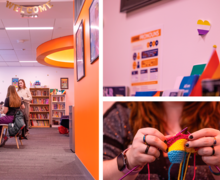Why experts say evidence cited by facilitated communication advocates is flawed
Chase Guttman | Staff Photographer
SU's Institute on Communication and Inclusion is housed in the School of Education.
Editor’s note: This article is a supplemental story to an April 11 Daily Orange story, “Double Talk: Syracuse University institute continues to use discredited technique with dangerous effects,” which examines SU’s Institute on Communication and Inclusion’s history of promoting facilitated communication. That story can be found here.
Christine Ashby firmly believes that, in many cases, facilitated communication (FC) is a valid method to use.
Ashby is the director of Syracuse University’s Institute on Communication and Inclusion, where FC is regularly promoted and practiced. The institute’s website outlines several studies that Ashby and other institute officials point to as evidence that authorship in FC is controlled by the nonverbal people who use it, not the facilitators.
They use those studies and specific anecdotes to dispute double-blind studies that have strongly indicated that FC authorship belongs to facilitators. But experts say that the studies cited by institute officials are deeply flawed, and that the anecdotes are unreliable as evidence.
Among the research cited on the institute’s website are a 1996 study, “An investigation of authorship in facilitated communication,” and a 2000 study conducted by German researchers.
The 1996 study was conducted by researchers Donald Cardinal, Darlene Hanson and John Wakeham. The study consisted of 43 FC users being shown a randomly selected word from a list of 100 words while their facilitator was kept out of the room. The facilitators were shown the list of 100 possible words before entering the room.
In all, 3,800 trials were conducted across the 43 students, with each being tested 90 times. Of those 3,800 trials, the correct answer was typed 9.6 percent of the time, which FC advocates see as evidence that the practice works. But in the same study, a correctly-spelled wrong word was typed more often — slightly more than 11 percent of the time.
“That tells you the facilitators are guessing,” said Jim Todd, a psychology professor at Eastern Michigan University.
In the 2000 German study, translated to “Facilitated Communication for Persons With Severe Communication Problems,” six out of seven student subjects were able to correctly solve multiple choice tasks through FC, according to the ICI website. But the same person who came up with the test materials also served as the facilitator, Todd said.
“These are not just methodologically unsound,” Todd said of that study and the rest cited by the institute. “These are some of the most incompetent studies in development disabilities.”
“All of the research that’s been done that supports FC, it’s completely flawed,” added Howard Shane, a speech pathologist at Boston Children’s Hospital who earned his Ph.D. at SU.
In addition to the 1996 and 2000 studies, Ashby and other officials also frequently point to specific instances of people using FC before ultimately becoming independent typists.
One such case is that of Jamie Burke, who has used FC since he was 5 and, according to the institute’s website, can now type independently.
“To me the question is, how do people not see that FC is real?” Ashby said. “How do they discount that?”
Experts discount it by arguing that correlation does not equal causation, and that Burke’s linguistic progression is fairly typical of people with moderate to severe autism.
Shane — who in addition to having a Ph.D. in speech pathology is also the director of the Autism Language Program at Boston Children’s Hospital — said that most of the nonverbal children he works with are ultimately able to achieve independent typing through his program.
“If someone’s going to be a typist, they don’t need somebody to facilitate them,” he said.
But Ashby and other leaders at the institute see it differently, opting to declare quantitative and anecdotal cases similar to Burke’s as evidence of FC effectiveness.
And though they build up studies such as the one conducted by Cardinal, Hanson and Wakeham, they also consistently disregard the roughly 40 empirical studies that have seemed to debunk FC. It’s an approach that can be traced back to the ideology of Douglas Biklen, the former dean of SU’s School of Education and who founded the institute.
Bruce Carter, an associate professor of psychology at SU who specializes in child development, said he knows Biklen well and that the former dean was never an advocate for empirical methods such as experimentation.
“There was this kind of sense that anything that’s qualitative is good and anything that’s quantitative is bad and even a sense that it was evil,” Carter said. “… But of course, people who take that perspective still use microwave ovens and drive cars and do a variety of other things that are the result of empirical research.”
Published on April 11, 2016 at 1:34 am
Contact Michael: mdburk01@syr.edu





